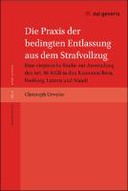Explore

Die Praxis der bedingten Entlassung aus dem Strafvollzug
Christoph Urwyler
2019
0 Ungluers have
Faved this Work
Login to Fave
The decision on conditional release from prison (Art. 86 – 89 SCC) is one of the most important decisions in the Swiss criminal justice system. At stake are both the freedom of the convicted person, who is to be given a chance of reintegration by the conditional release, and the security of the general public, which must be protected against the commission of further criminal offences. Despite its significance for convicted persons and the society as a whole, the practice of conditional release is scarcely discussed in Swiss literature: What is the procedure for conditional release? How do the opinions of the parties involved in the procedure influence its outcome? How do the persons responsible for conditional release exercise the discretion left to them by the law? The clarification of these issues seems all the more important given that in recent decades the number of conditional release decisions has decreased and there are considerable cantonal differences. The focus of the dissertation is on the process of decision-making by the responsible authorities in Switzerland, in particular the implementation of the right to be heard, as well as the criteria which influence the decision on the conditional release of offenders. The research is based on a representative sample of 943 criminal files from the cantons of Berne, Fribourg, Lucerne and Vaud, which are evaluated using statistical methods (logistic regression). The results of the investigation show that the responsible authorities select only a few aspects from a large number of case characteristics that largely determine their decision-making process. The decision is strongly influenced by the residency status of the convicted person, his criminal record and the opinion of the prison authorities. The legal prognosis is therefore primarily based on static factors from the past, whereas dynamic factors which the convicted person or the involved actors could influence are more secondary. In addition, it emerges that the temporal and cantonal differences in the release rates do not relate to a differing prison population, as it most often assumed, but to a different way of implementing the law and appreciating the profile of prisoners – following a more restrictive or liberal understanding and practice of the release decision – depending on time and canton. The study shows as well that there is no uniform practice for the procedure: the use of risk assessment tools, the opinions of the prison management or the organisation of the right to be heard are extremely disparate and therefore the right of the sentenced person to an equal and fair trial is not guaranteed to the same extent everywhere. The work concludes with a legal classification of the findings as well as with criminal policy considerations and proposals for a more precise reformulation of Art. 86 SCC. These should contribute to a more harmonious and broader application across cantonal borders and therefore strengthen conditional release as an efficient instrument of crime prevention.
This book is included in DOAB.
Why read this book? Have your say.
You must be logged in to comment.
Rights Information
Are you the author or publisher of this work? If so, you can claim it as yours by registering as an Unglue.it rights holder.Downloads
This work has been downloaded 271 times via unglue.it ebook links.
- 190 - pdf (CC BY) at OAPEN Library.
Keywords
- Bedingte Entlassung
- Conditional release
- criminal justice system
- criminal law
- Criminal law & procedure
- Criminal procedure
- Criminal Procedure Law
- Decision-making
- Entscheidungsfindung
- Law
- Laws of Specific jurisdictions
- quantitative Methoden
- Quantitative methods
- Recht
- Rechtstatsachenforschung
- Resettlement
- Socio-legal studies
- Strafprozessordnung
- Strafrecht
- Strafvollzug
- thema EDItEUR::L Law
- thema EDItEUR::L Law::LN Laws of specific jurisdictions and specific areas of law::LNF Criminal law: procedure and offences::LNFX Criminal procedure
- Übergangsmanagement
Links
DOI: 10.24921/2019.94115937Editions

